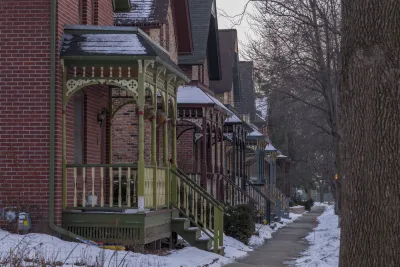The Federal Reserve Bank of Minneapolis has noticed an alarming spike in investor-owned homes in Minneapolis since the Great Recession.

The Federal Reserve Bank of Minneapolis has started monitoring a disturbing trend, writes Joy Wiltermuth: "an explosion of investor-owned homes" in high-poverty neighborhoods. According to a Minneapolis Fed report, the rate of investor-owned homes rose sharply after the Great Recession, with a growing number of 'very large' investors—those who own 50 or more properties—snapping up foreclosed homes. The trend accelerated during the COVID-19 pandemic as some homeowners were forced to sell or fell into foreclosure.
"One concern is that deep-pocketed investors 'make it harder for families, particularly lower-income households who are more likely to be people of color, to compete in the home-buying process,' according to the report." In Northeast Minneapolis, where the poverty rate is 41.7 percent, investors own close to a third of residential properties. The report also cites concerns that increased ownership by absentee investors who provide little maintenance will lead to the deterioration of housing stock and poor conditions for tenants.

National Parks Layoffs Will Cause Communities to Lose Billions
Thousands of essential park workers were laid off this week, just before the busy spring break season.

Retro-silient?: America’s First “Eco-burb,” The Woodlands Turns 50
A master-planned community north of Houston offers lessons on green infrastructure and resilient design, but falls short of its founder’s lofty affordability and walkability goals.

Delivering for America Plan Will Downgrade Mail Service in at Least 49.5 Percent of Zip Codes
Republican and Democrat lawmakers criticize the plan for its disproportionate negative impact on rural communities.

Test News Post 1
This is a summary

Test News Headline 46
Test for the image on the front page.

Balancing Bombs and Butterflies: How the National Guard Protects a Rare Species
The National Guard at Fort Indiantown Gap uses GIS technology and land management strategies to balance military training with conservation efforts, ensuring the survival of the rare eastern regal fritillary butterfly.
Urban Design for Planners 1: Software Tools
This six-course series explores essential urban design concepts using open source software and equips planners with the tools they need to participate fully in the urban design process.
Planning for Universal Design
Learn the tools for implementing Universal Design in planning regulations.
EMC Planning Group, Inc.
Planetizen
Planetizen
Mpact (formerly Rail~Volution)
Great Falls Development Authority, Inc.
HUDs Office of Policy Development and Research
NYU Wagner Graduate School of Public Service





























